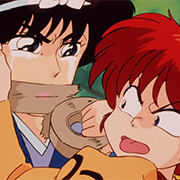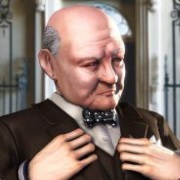|
OctaviusBeaver posted:Aren't they pretty touchy about the fact that Best China did the vast majority of the fighting against the Japanese? A lot of the modern CCP's legitimacy derives from fighting the Japanese.
|
|
|
|

|
| # ? May 24, 2024 15:57 |
|
I haven't done it in a year and a half or so, but my strategy was always to start improving relations w/ the Soviets on day 1 and fabricate a war goal against your eastern neighbor asap. You should be able to join the Comintern at max relations w/ the USSR. If you start fabricating against your eastern neighbor as soon as possible you should have a big numerical advantage over them for the first week or two of the war until their first new divisions appear, during which time you can manually control your divisions to capture the enemy capitol / take as much poo poo as you can. The first war you have to win by rushing because while the Soviets will generally accept an invitation to it, the Mongolians won't, which means the Soviets won't be able to get to your territory and you'll be stuck on your own (sometimes the Mongolians will accept an invitation from you or the Soviets after a while. Seems to depend on whether they view the target as a threat.) I never had the Mongolians refuse to enter a war after that (and when you take Sinkiang they'll have a border with you anyway) so you can use the Soviets as a beat stick to help you capture the other warlords. There are a few ways to handle the Japanese, but what I found most successful was attacking Nat China a month or so after Japan invades them. That way you get the western side mostly to yourself while Japan keeps them busy in the north. You still need to have a pretty big army to take enough territory for this to work out so the timing can be tricky (the Soviets usually don't want to join this one). You'll get a peace conference after China capitulates where you split them up w/ Japan (or you could probably declare on Japan before the Nat China peace conference fires and avoid splitting it up if you feel comfortable fighting them immediately). From there you build up your army until you feel ready to attack Japan (or Japan attacks you). Edit: Communist China's a really fun nation to play in HOI because you get to see the full scope of the combat system from having so few units in the beginning that you're manually planning all of their moves like in HOI 2 to the end when you're using the army planning tools to move huge army groups led by generic commanders because you have so many armies that you ran out of actual historical commanders ages ago. The only problem is the campaign is basically "solved" by '40-'41 (when you kick the Japanese out of Korea / Manchuria) and then if you want to stick it out to the end you're going to be spending years developing the naval technology to invade Japan and then if things go bad in the west (likely) you can wind up trying to push Germany back across half of Asia, which sucks. Randallteal fucked around with this message at 21:56 on Jun 1, 2021 |
|
|
|
alcaras posted:Dumb question: Is there a good RSS feed for the Dev Diaries? There used to be but unfortunately I think they killed it last time they reorganized the forum. Or at least put it somewhere I can't find. It was hit or miss anyway though because dev diaries don't always get properly featured on the front page
|
|
|
|
It's not just borders stuff that the CCP government is concerned about. A few years ago they banned what I think was a dating sim based on China's imperial past because of ďobscene contents and the risk of political metaphorsĒ. https://techcrunch.com/2019/04/21/chinas-new-gaming-rules-to-ban-poker-blood-and-imperial-schemes/ It's pretty natural for an autocratic state to be capricious and seemingly random about its censorship laws and enforcement.
|
|
|
|
Sometimes the censor just has a stick up his rear end, or he wants a bribe and figures holding up your project is a good way to get one.
|
|
|
|
Yeah it's worth remembering that being a censor of games is an appointed relatively low-level bureaucratic post in a non-critical part of the government. Ambitious bureaucrats want to show their zeal through constant activity, greedy ones want bribes, and lazy/incompetent ones who view it as a sinecure don't give a drat (unless for whatever reason they feel like they need to show SOME work to demonstrate they're worthwhile). Basically take that Prussian matrix of lazy/active and competent/incompetent officers and remember it applies to bureaucracy too. Also I'm guessing that the CCP doesn't usually put their best and brightest in the "video game censorship department."
|
|
|
Jazerus posted:misunderstandings of chinese censorship in the west are pretty common. often companies adopt bizarre general rules, such as "no skeletons" (Blizzard), that are more about being extremely careful so as to avoid even the vague possibility of a particularly rigid or protectionist censor deciding they were putting one toe over the line. these rules are taken by a lot of Gamers to be the actual rules that are used by the chinese government, but they aren't. from what i understand chinese media tends to stay within the actual rules, so many of the things that people think are banned in chinese media are, uh, not actually banned. I was a lawyer working with the games industry in China around the time of the Blizzard/NetEase/The9 clusterfuck. That was 0% about cultural sensitivities and 100% about which Chinese company got the monopoly on a very large income stream from Blizzard, to the extent that each of them had their supporters in different government departments literally passing contradictory legislation over who had the right to regulate this lucrative business.
|
|
|
|
|
Raenir Salazar posted:I think its more to do with controlling the way people think about the authority of the government; if a century unending national defeats and chaos is possible then, what stops it from being possible now? Basically a form of Newspeak, by eliminating certain words and meanings you make it difficult for people to imagine the concept. There's also on the other end of the spectrum, the issue of ultranationalism, which is something CCP has difficulty keeping contained and revanchism is a powerful tool that is also a double edged sword. I mean sorry this is totally wrong. Not to say there isn't totally arbitrary and capricious censorship, but Chinese people are taught about the civil war and the kmt very well. Obviously this is taught in a certain ideological light, but which country isn't guilty of this? Censorship of foreign stuff should be seen much better as a way for china to bring in revenue for its own companies, either by copying the foreign products, or making the companies "license" out their products to a Chinese company. 90% of the time it's something like this rather than actual concern for what people might see. Furthermore, as someone who's lived in China for five years and is married to a Chinese, I'd say the average Chinese knows much more about their own history than americans, lol. Oh yeah, what other dudes were saying about nationalism crazed netizens is also correct, but I think (hope) that that's a small vocal minority and most Chinese don't give a poo poo.
|
|
|
|
Tomn posted:Also I'm guessing that the CCP doesn't usually put their best and brightest in the "video game censorship department." I assume Paradox games get assigned to some old curmudgeon whoís never played before who starts one campaign China, gets their rear end kicked because they donít know how to play at all and are starting with a hard nation and gets pissed that the game nerfed China because they lost horribly and only see the bad events.
|
|
|
|
frankly I'd be shocked if the games even really get played/tested so much as "china isn't unified, it's not so far in the past/abstracted enough to be ignorable, and Tencent only owns like a 5% stake in the company so just refuse to pass em".
|
|
|
|
IIRC the Censorship department originally was under the umbrella of the more conservative faction/part of the Chinese government; different parts of the Chinese government vary in their desire for ideological purity and their zeal in pursuant of it.
|
|
|
|
Authoritarian bureaucratic state has lots of factionalism and corruption, what a surprise
|
|
|
|
Mirello posted:Furthermore, as someone who's lived in China for five years and is married to a Chinese, I'd say the average Chinese knows much more about their own history than americans, lol. This is totally tangential to your point but it's something I think about from time to time but basically never get an opportunity to rant about so, I'm not gonna go against the idea that an average person in a country knows more about their country's history than like 98% of foreigners--most people learn jack all history about other places--but while I think there's some cultural perspectives that are extremely difficult/nearly impossible for even a historically inclined foreigner to ever learn as well as even an average native (e.g. folklore and mythology, vibes around which historical figures are cool/nasty), I'm fairly firmly of the opinion that if you've even read like one academic survey book with the intent to actually learn the material, you probably have a better understanding of the place's history than basically everyone that went through its local education system that wasn't themselves a history nerd. You'll probably have a lot of different perspectives, maybe be unfamiliar with a bunch of figures that they might consider important, but you'll probably overall have if anything a significantly fuller perspective than they do. As a British person with very little interest in my own country's history, maybe it'd take a complete outsider a while to understand the reactive revulsion I associate with Oliver Cromwell or Henry VIII, but even properly reading the Wikipedia page on British history would probably expose them to a whole bunch of events that never came up (let alone that I actually committed to memory) when I was in school, and a better broad strokes understanding of it on the whole than the disjointed bits and pieces I happened to commit to memory. And even though I don't care much about British history, I'm still a history nerd, so I reckon I'm a leg or two up over your average native. It's not that high a bar, really. Conversely, and I realize saying this pegs me as a bit of an rear end in a top hat, but while like I said there's a bunch of things (and particularly figures) I don't know so well that most would surely consider important, I'm pretty certain I have a way better grasp of Korean history than the majority of Koreans, and a way, way better grasp of ancient Korean history. Learning about it for leisure and so getting to skip things I'm not as interested in (e.g. poetry, classical philosophy) definitely leaves me with some gaping holes that I should probably fill before being so braggadocious, but on the flipside I know I've studied the context and international perspective way more than most Koreans will ever see in school, and there's a significant amount of English language scholarship that offers a perspective on Korean history (not necessarily better, but still different and valuable) that even Korean history grad students won't be exposed to. Anyway this is my longwinded way of arguing that while native perspectives on history and culture are absolutely vital, depending on the particular subject, outsiders' perspectives can offer things that native ones never can as well. Not that I rate your average internet nerd's (e.g. me) understanding of the internal workings of the CCP on that kind of level, which I guess is what we're actually talking about, but still.
|
|
|
|
So Henry VIII is an rear end for obvious reasons, but I would like to know what you hated that much about Cromwell. Yeah, he was a religious fanatic who betrayed the ideals of a supposedly republican revolution, but I feel there were a lot of those in history.
|
|
|
|
Hellioning posted:So Henry VIII is an rear end for obvious reasons, but I would like to know what you hated that much about Cromwell. Yeah, he was a religious fanatic who betrayed the ideals of a supposedly republican revolution, but I feel there were a lot of those in history. He also tried to wipe out the Irish. Although there's no shortage of people doing that in history either.
|
|
|
|
Mirello posted:I mean sorry this is totally wrong. Not to say there isn't totally arbitrary and capricious censorship, but Chinese people are taught about the civil war and the kmt very well. Obviously this is taught in a certain ideological light, but which country isn't guilty of this? I think you're taking that paragraph a bit out of context, as I say the opposite in a different post. Raenir Salazar posted:Yeah I imagine pivotal historical events like Three Kingdoms or the Spring and Autumn probably can depict a disunified China without much fuss. The Chinese netizens I talk to are always super stoked when I mention anything to do with Chinese history, so clearly they're taught it and experience it in their media. See? quote:Furthermore, as someone who's lived in China for five years and is married to a Chinese, I'd say the average Chinese knows much more about their own history than americans, lol. I hope this isn't directed at me since I didn't claim this. Also I'm not American.
|
|
|
|
I think the fact that the current government of England descends from the restored Monarchy after Cromwell's government didn't go anywhere after his death makes it easier for the UK school system to demonize his place in history. But Parliament keeps a statue of him around, so I don't exactly know the connotation of that. I guess as a reminder of the time that the King and Parliament fought and Parliament won?The Cheshire Cat posted:He also tried to wipe out the Irish. Yeah, so far as I know that doesn't make him unique in British history, and it's definitely not in character for the UK to decry one of their formative figures for something they did to the not-english. I think from what I've heard, what gets emphasized and exaggerated are some of the eccentricities of puritanism like banning Christmas instead of any details about establishing a republic or constitutional legality or the checks and balances of the government he made that parliament kept rejecting.
|
|
|
|
Koramei posted:This is totally tangential to your point but it's something I think about from time to time but basically never get an opportunity to rant about so, Lol, this is a great and well written post but you were misunderstanding me dude. Foreign perspectives can definately know more than natives. I'm an American and I was saying Chinese know more about Chinese history than americans learn about our american history. The educational system is piss poor in America. That's it. Sorry if I offended anyone!
|
|
|
|
Mirello posted:Lol, this is a great and well written post but you were misunderstanding me dude. Foreign perspectives can definately know more than natives. I'm an American and I was saying Chinese know more about Chinese history than americans learn about our american history. The educational system is piss poor in America. That's it. Sorry if I offended anyone! Well duh! Because there's 6000 years of Chinese history and only 300 years of American history!
|
|
|
|
Hellioning posted:So Henry VIII is an rear end for obvious reasons, but I would like to know what you hated that much about Cromwell. Yeah, he was a religious fanatic who betrayed the ideals of a supposedly republican revolution, but I feel there were a lot of those in history. This is honestly exactly one of the kinds of things I do think non-natives will always be at a disadvantage compared to natives on. I donít have a clear reason for hating Cromwell; I can barely tell you what he did. I just remember the teacher talking with a vague tone of disgust, primary school children laughing about him, childrenís history programs making jokes about him that I watched in the background as a kid. Just like how youíll be passively exposed to folk tales and so on while growing up, itís these kinds of things (ambiently picked up in primary school) that I think foreigners for whatever country will almost never match natives on, no matter how hard they study the place. Conversely, going back to Cromwell, any non-British thatís actually read about the guy could completely blow me out of the water with his actual significance and macro historical context and so on in a way I have no clue about.
|
|
|
|
Okay, fair. I just finished relistening to the revolution podcast about the English civil war and while Cromwell was a jerk he didn't seem like the worst person in that era by far.
|
|
|
|
I would guess they hate him because he overthrew the king and the current state is a monarchy so overthrowing kings is bad?
|
|
|
|
Fair!
|
|
|
|
VostokProgram posted:I would guess they hate him because he overthrew the king and the current state is a monarchy so overthrowing kings is bad? I think the UK just likes to hold grudges. They still burn Guy Fawkes in effigy every year because he tried to blow up parliament 400 years ago.
|
|
|
|
Hellioning posted:Okay, fair. I just finished relistening to the revolution podcast about the English civil war and while Cromwell was a jerk he didn't seem like the worst person in that era by far. That does leave out the bits about killing the irish, but I'm still not sure that's actually a different policies from the monarchs before and after him.
|
|
|
|
How do you know they didn't have it coming?
|
|
|
|
Mantis42 posted:How do you know they didn't have it coming? That's not funny
|
|
|
|
currently trying to figure out how the gently caress cultures work in imperator
|
|
|
|
SlothfulCobra posted:That does leave out the bits about killing the irish, but I'm still not sure that's actually a different policies from the monarchs before and after him. He was putting down a rebellion caused by the last government's lovely handling of the Irish situation so not really all that different no.
|
|
|
|
"Faced with the prospect of an Irish alliance with Charles II, Cromwell carried out a series of massacres to subdue the Irish. Then, once Cromwell had returned to England, the English Commissary, General Henry Ireton, adopted a deliberate policy of crop burning and starvation, which was responsible for the majority of an estimated 600,000 deaths out of a total Irish population of 1,400,000." War and Underdevelopment: Economic and Social Consequences of Conflict v. 1 (Queen Elizabeth House Series in Development Studies), Oxford University Press. p. 51. Cromwell can eat poo poo.
|
|
|
Gaius Marius posted:"Faced with the prospect of an Irish alliance with Charles II, Cromwell carried out a series of massacres to subdue the Irish. Then, once Cromwell had returned to England, the English Commissary, General Henry Ireton, adopted a deliberate policy of crop burning and starvation, which was responsible for the majority of an estimated 600,000 deaths out of a total Irish population of 1,400,000." this is much worse than i thought it was, holy poo poo yeah that's a bit beyond the standard level of british shittiness toward ireland
|
|
|
|
|
That casualty rate is higher than Poland in ww2. Holy gently caress
|
|
|
|
Koramei posted:This is honestly exactly one of the kinds of things I do think non-natives will always be at a disadvantage compared to natives on. I donít have a clear reason for hating Cromwell; I can barely tell you what he did. I just remember the teacher talking with a vague tone of disgust, primary school children laughing about him, childrenís history programs making jokes about him that I watched in the background as a kid. I've just recently listened to BBC In Our Time show about the Interregnum. It assumed I already knew who Cromwell was. There were professional historians there talking about his deeds and plans and problems. It sounded like he was a genocidal dude, but it's a 17th century, so it felt more like an early Napoleon rather than early Hitler. And naturally plenty of mass murderer's are celebrated as heroes. I wouldn't be surprised if someone told me that Cromwell is a national hero because of early republicanism or something. At the same time that powder plot Guy is a mystery to me. Is it supposed to be funny or mocking to wear his mask? Is he a hero? Is he a villain? I don't get it even though I learned about Powder Plot too.
|
|
|
|
SlothfulCobra posted:Alphabets are vulnerable to phonetic drift, but otherwise they'll still always give people a frame of reference when learning new words, and also are a lot simpler to get working in machines. I don't know if there ever was a Chinese typewriter, but I know that China invented movable type before Gutenberg, but apparently didn't have the same kind of printing revolution because it wasn't as easy for them to use. Chinese writing (especially traditional, while simplified introduces new blockscript versions of cursive, and especially older speech as pronunciations remain truer to the oldest form) also has a pretty solid frame of reference; most characters outside of the basic couple hundred are composed of two or more of those basic characters in a predictable way, either both giving meaning (休 rest from 人 person and 木 tree, 林 and 森 for grove and forest, etc) or one giving pronunciation and one giving meaning (country/guo2 from *kʷɯːɡ, 國, is ⼞ enclosure 或 huo4 from *ɡʷɯːɡ). Over 90% of the existing corpus is the second type, so while there's some awkwardness to producing print--though not as much as could be assumed given half-width, half-height, and quarter-sized versions can account for most of these--a semiliterate speaker encountering a new character is if anything going to have a lead over an alphabet-user, knowing not only the predrift pronunciation but also a rough category: 鮭 is the fish pronounced gui, 鱈 is the fish pronounced xue, and so on. Typewriting, both in Chinese and Japanese which as previously noted didn't seem to slow Japanese actual-literacy or game-stat-literacy much, was somewhat late but not necessarily outside of the target time period, and somewhat more time-consuming but not particularly complex to actually do (the user was presented with a crossing pair of bars over a typebox that would retrieve and strike the needed character.) The European printing revolution had more to do with the ease of radical authors picking up shop and moving to a more sympathetic court, yet still being able to easily smuggle their output back in, if a work became controversial, and secondarily with one particular book being the burning political question of the day, than it did with any serious material advantage at actually printing. Mandoric fucked around with this message at 06:58 on Jun 2, 2021 |
|
|
|
ilitarist posted:At the same time that powder plot Guy is a mystery to me. Is it supposed to be funny or mocking to wear his mask? Is he a hero? Is he a villain? I don't get it even though I learned about Powder Plot too. People wear his mask because of V For Vendetta. In real life he was just some religious nut who tried to blow up Parliament, I think.
|
|
|
|
ilitarist posted:I've just recently listened to BBC In Our Time show about the Interregnum. It assumed I already knew who Cromwell was. There were professional historians there talking about his deeds and plans and problems. It sounded like he was a genocidal dude, but it's a 17th century, so it felt more like an early Napoleon rather than early Hitler. And naturally plenty of mass murderer's are celebrated as heroes. I wouldn't be surprised if someone told me that Cromwell is a national hero because of early republicanism or something. As I understand it as a non-Brit, Guy Fawkes is not really an ambiguous figure in the UK (he is the villain), but his image is often used in an ironic way to make a political statement (this is how V for Vendetta was using it). Like the actual historical gunpowder plot was not some sort of radical rebellion against the monarchy or whatever - Guy Fawkes was a religious extremist and specifically wanted a more repressive state (he was angry at the monarchy because of their split from the Catholic church). Bonfire night is basically a big celebration about the fact that he failed.
|
|
|
|
Gaius Marius posted:"Faced with the prospect of an Irish alliance with Charles II, Cromwell carried out a series of massacres to subdue the Irish. Then, once Cromwell had returned to England, the English Commissary, General Henry Ireton, adopted a deliberate policy of crop burning and starvation, which was responsible for the majority of an estimated 600,000 deaths out of a total Irish population of 1,400,000." Wowzers. gently caress Cromwell indeed.
|
|
|
|
So the masks were invented by V for Vendetta? Huh, I thought it was built on an existing tradition. See, a lot of stuff here depends on context. I can read a whole book on Cromwell or Gunpowder Plot and still don't understand how they feel in modern culture.
|
|
|
|
As I understand it, the real truth to Guy Fawkes Night is that England is full of a lot of poo poo that is mainly done because it has been done for a very, very long time, and if you really stuck in to keep track of the origins of each one, you'll lose your patience and lose track eventually, so after a point people will just go along with whatever. Although a lot of traditions will end up being very pro-government, since they're the guys who get to determine whether a lot of traditions can even start in the first place. The Cheshire Cat posted:Like the actual historical gunpowder plot was not some sort of radical rebellion against the monarchy or whatever - Guy Fawkes was a religious extremist and specifically wanted a more repressive state (he was angry at the monarchy because of their split from the Catholic church). Bonfire night is basically a big celebration about the fact that he failed. That's sort of contingent on ignoring how the catholic church could often act as an independent check on monarchs' power in a lot of cases, and also ignoring a lot of what protestant England did to catholics. There's a lot of layers to these things.
|
|
|
|

|
| # ? May 24, 2024 15:57 |
|
Yeah like. Catholic Church Bad. But man wanting to divorce his wife and also kill two of them for dumb reasons and then divorce another one for a dumb reason is also bad. And Protestants Persecuting Catholics is also bad.
|
|
|


































